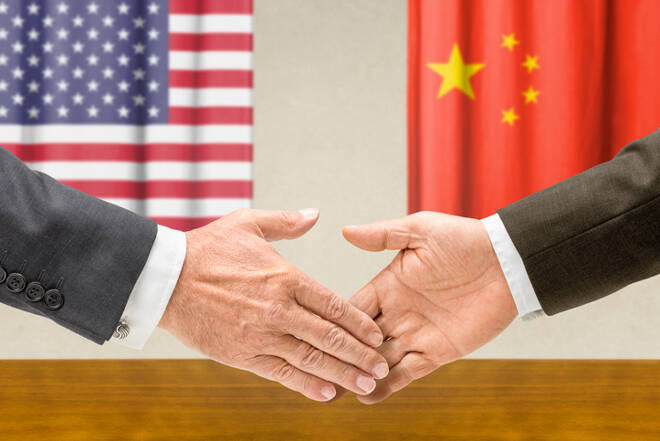Advertisement
Advertisement
U.S.-China Agree to Restart Trade Negotiations; Trump Suspends New Tariffs
By:
For nearly two months, a series of escalations to the on-going trade spat between the United States and China had held the financial markets hostage, nearly forcing a change in U.S. monetary policy, while threatening to drive the global economy into recession.
In a move that should have a major impact on the financial markets on Monday, U.S. President Donald Trump and Chinese President Xi Jinping agreed on Saturday at their meeting at the G-20 summit in Osaka, Japan, to proceed with trade negotiations.
For nearly two months, a series of escalations to the on-going trade spat between the United States and China had held the financial markets hostage, nearly forcing a change in U.S. monetary policy, while threatening to drive the global economy into recession.
After meeting for about 80 minutes, the two leaders emerged with the news that trade negotiations were back on. Furthermore, it looks like Trump offered a few concessions to get the deal-making process moving forward.
Chinese state-run press agency Xinhua described the meeting result as the presidents agreeing “to restart trade consultations between their countries on the basis of equality and mutual respect.”
Trump said afterwards that the meeting had gone as well as it could have, and that negotiations with China would continue. “We are right back on track,” the president said.
Concession 1: Huawei Can Buy U.S. Products
Trump suggested he will be reversing his administration’s decision to ban American companies from selling products to the tech giant. However, Trump emphasized the issue of Huawei will be resolved only at the conclusion of the negotiations.
“We mentioned Huawei. I said we’ll have to save that until the very end,” Trump said during a post-summit news conference. “One of the things I will allow, however, is – a lot of people are surprised we send and we sell to Huawei a tremendous amount of product that goes into a lot of the various things that they make – and I said that that’s OK, that we will keep selling that product.”
Concession 2: No Escalation of Tariffs
Trump also indicated that China would be buying large quantities of U.S. agricultural products following his meeting with Xi. “We’re holding on tariffs, and they’re going to buy farm product,” he said.
Impact on Financial Markets
In my opinion, the news of the resumption of trade talks between the U.S. and China has lifted the uncertainty that had been hanging over the stock market. This should cause an early spike higher in the markets. Whether investors can hold on to the gains will likely be determined by the direction of U.S. Treasury yields.
If Treasury yields jump then Treasury Notes and Bonds could drop sharply. The news may cause investors to reduce the chances of a Fed rate cut at the end of July. Remember, the Fed is not being forced to lower rates, but may do so as an insurance policy against future weakness.
Powell said last week that while there is greater uncertainty about trade and worries about the global economy, officials don’t know how long this may last or how serious the drag might be.
Powell also said Fed officials are mindful that monetary policy “should not overreact to any individual data point or short-term swing in sentiment.”
Essentially, the Fed doesn’t want to get caught cutting rates in July then raising them later in the year or early 2020 if there is a quick end to the trade dispute, and a fast recovery on the U.S. economy. This would send a message of weakness to the investing community.
About the Author
James Hyerczykauthor
James Hyerczyk is a U.S. based seasoned technical analyst and educator with over 40 years of experience in market analysis and trading, specializing in chart patterns and price movement. He is the author of two books on technical analysis and has a background in both futures and stock markets.
Advertisement
